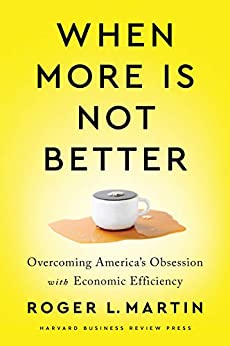When More Is Not Better
Overcoming America's Obsession with Economic Efficiency


Roger Martin was the Dean of the Rotman School of Management at University of Toronto from 1998 to 2013, and is a premier league management thinker. He is most notably associated with the concept of Integrative Thinking . He is author of numerous books and a regular columnist and expert voice in the media. This book is, however, focused on the area of work emanating from the eponymous Martin Prosperity Institute at Rotman, in particular his work on the Future of Democratic Capitalism.
Martin’s focus in this book is founded on the dislocation that has occurred in the industrialised world between the rewards people receive and the output generated. By late 2019 it was evident that the elite had been doing better than the rest for some time, exemplified by the growing disparity between top executive pay in comparison to that of everyone else.
The book was written (though not published) before the Covid-19 pandemic took hold, so many of the key drivers he cites seem oddly blind to today’s preoccupations and new contexts.
Economic growth in the last two centuries has been based upon the concept that business and the economy are a ‘perfectible machine’, which with ever-more finely calibrated tweaks will increase prosperity for the majority (the middle-classes) as well as the poor and the rich. In the four decades since the US bicentennial in 1976 (his selected pivot year) this growth has ceased to provide the prosperity increase it is supposed to, and a consequential disillusionment has started to set in, rotting the foundations of democratic capitalism.
The core problem, Martin asserts, is the relentless pursuit of efficiency, ignoring the natural balancing all systems require, the most notable element is that of ‘resilience’, which needs the system to be more ‘adaptive’ than the efficiency focus allows for.
The solution comes with an acknowledgement that we cannot reach ‘perfection’ by just striving for continual improvement, we need to adjust to new contexts and circumstances as they arise with alternative solutions which are not purely based on the maximisation of efficiency. As Martin says, “businesses are part of a natural and highly complex system, characterised by a large number of interdependencies and contingencies.”
These interdependencies make trying to accurately forecast the future “a fool’s errand”. He highlights the failure of Toys’r’Us and iHeartMedia in 2017, not through poor operational management, but because they were owned by Leveraged Buy-Out firms focused on future cash flows and critically “maximising the benefit of the LBO-investors, with no regard whatsoever for the employees.” That single-minded focus debilitated the companies’ resilience.
The pursuit of perfection can be ‘delusional and dangerous’ in a complex system, as it reduces the space for error to occur (see Meltdown). Systems need to be designed with ‘firebreaks’ in them, to prevent systemic collapse occurring, a concept the author notes that Zeynep Ton of MIT, also references as ‘slack’.
Martin sees the issue that too much specialist focus on the economy as a machine of many parts occurs, and too little see the whole, integrated eco-system, and the impact that one element can have on another.
To rebuild resilience requires a reconstruction around the three core features of natural systems: complexity, adaptability and systemic structure.
Most CEOs believe in managerial reductionism, breaking processes down into small, discrete parts. It is easier to manage and refine like this, with the benefit that finding people to manage discrete processes and become expert at them is easier than getting people who have an integrative mindset, so they are plentiful to find and therefore cheaper to employ, so increasing efficiency, but all at the cost of the systems resilience.
Martin does not just offer solutions for business folk, but also politicians, educators and citizens. He concludes with a plea for a multiple, diverse, non-ideological approach to resolving the Democratic Capitalist decline. It is through experimentation, many small projects and open-mindedness that resolution lies. Diversity in approach, will, as in nature, lead to survival. So abandonment of the pursuit of hyper-efficiency (especially through the capital markets for business) as the primary goal cannot happen soon enough.
Title: When More Is Not Better
Author/s Name/s: Roger L. Martin
Publisher: Harvard Business School Publishing
ISBN: 978-1-647-82006-0
Publishing Date: September, 2020
Number of Pages: 215
Author Knowledge Rating: 1-5 (based on their years of experience, academic expertise in subject areas, and exposure to cross-functional thinking in the area)













































































Readability: 1-5 score(1=dense and v academic; 5=frantic; page turner)































































































Appropriate Length: (1=could have been written in 25% of the length;5=could have been longer)















































































Core Idea Value: (1=nonsense (or entirely esoteric); 5=game-changer)














































































